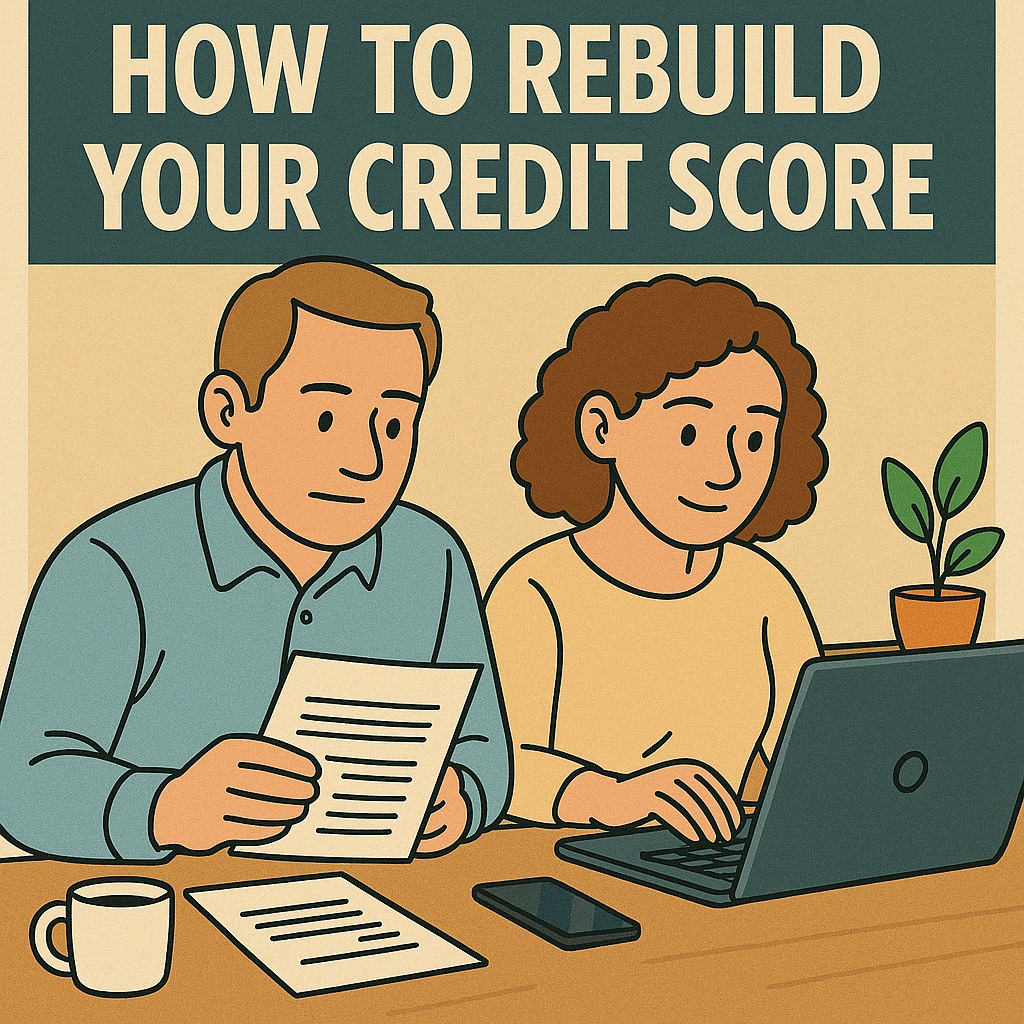Having bad credit can feel overwhelming, especially when it seems like every financial institution is weighing your past mistakes. However, it’s important to remember that bad credit isn’t a life sentence. You can raise your credit score quickly—even with bad credit—by taking strategic steps. This guide is here to help you through the process. Whether you’ve had a tough financial past or are just looking for ways to bounce back, there’s hope. Let’s explore how you can start improving your credit today.
Understanding What a Bad Credit Score Means
A “bad” credit score is typically considered any score under 580, according to FICO, the most widely used credit scoring model. Scores in this range indicate to lenders that you’re a higher risk, often due to past missed payments, defaults, or maxed-out credit limits. It may feel like a huge setback, but it’s important to remember that your score isn’t set in stone.
Before we dive into specific strategies, it’s crucial to know that raising your credit score won’t happen overnight. However, with a few quick actions, you can make a noticeable difference within a few months.
Step-by-Step Guide to Raising Your Credit Score Quickly
Now that you have a better understanding of what constitutes bad credit, let’s walk through practical, quick steps to help raise your score.
1. Check Your Credit Report and Dispute Any Errors
The first and perhaps most crucial step in raising your credit score is to pull your credit report. You’re entitled to a free credit report from the three major credit bureaus—Equifax, Experian, and TransUnion—once per year through AnnualCreditReport.com. Take the time to review your reports carefully for errors. Any mistakes, such as inaccurate account information, can negatively affect your score.
Actionable Tip: If you spot an error (like a late payment that wasn’t late), dispute it with the credit bureau. Fixing an error can potentially boost your score by several points almost immediately.
How to Dispute a Credit Report Error
- Contact the credit bureau that reported the error.
- Write a dispute letter explaining the mistake and provide any supporting documentation.
- The credit bureau must investigate and resolve your dispute within 30 days. If the error is corrected, your score could improve right away.
2. Become an Authorized User on Someone Else’s Account
If you have a trusted friend or family member with good credit, you can ask to be added as an authorized user on one of their credit card accounts. This allows you to benefit from their positive payment history and low credit utilization rate, which can have a quick and noticeable impact on your score.
Actionable Tip: Ensure the person you ask to help you has a good credit history, low credit utilization, and a clean payment record. Becoming an authorized user won’t require you to use the card or even hold it—it’s all about gaining a credit score boost from their responsible financial behavior.
3. Pay Down Your Credit Card Balances
One of the most significant factors in determining your credit score is your credit utilization ratio, or how much credit you’re using relative to your total credit limit. Ideally, you want to keep your credit utilization under 30%, meaning that if your total credit limit across all cards is $1,000, you shouldn’t be carrying balances of more than $300.
Actionable Tip: If you have available funds, pay down any existing credit card balances as quickly as possible. Reducing your credit utilization ratio can provide a quick boost to your score.
4. Ask for a Higher Credit Limit
If paying down balances isn’t an option,
you can still lower your credit utilization by increasing your credit limit. By contacting your credit card issuer and requesting a higher credit limit, you reduce the percentage of available credit you’re using. It’s a relatively simple step that can help improve your score—without requiring you to pay down existing balances right away.
Actionable Tip: When asking for a credit limit increase, avoid making large purchases soon after. An increase in your limit combined with responsible spending can have a positive, almost immediate effect on your credit utilization ratio and, consequently, your score.
5. Make All Payments on Time—No Exceptions
Your payment history is the single most important factor in determining your credit score. A missed or late payment can tank your score, especially if you already have bad credit. On the flip side, consistently making payments on time will help improve your score over time.
Actionable Tip: Set up automatic payments or calendar reminders to ensure that all your bills—credit cards, loans, utilities—are paid on time. Even one late payment can take several months to recover from, so avoiding this mistake is crucial to improving your credit score quickly.
6. Diversify Your Credit Mix
Credit score models also consider the types of credit you have, such as revolving credit (credit cards) and installment loans (car loans, mortgages). If you only have credit cards or one type of credit, diversifying your credit portfolio can help raise your score.
Actionable Tip: Consider taking out a small personal loan or a credit-builder loan. These loans are designed to help individuals with poor or no credit establish a positive credit history. Although they won’t boost your score overnight, adding a new type of credit to your mix can contribute to your overall credit health.
7. Get a Secured Credit Card
If you have bad credit, getting approved for a traditional credit card can be challenging. A secured credit card is a good alternative. These cards require a cash deposit (usually equivalent to your credit limit) but allow you to build or rebuild your credit as you make timely payments.
Secured credit cards report to the major credit bureaus, so they can be a powerful tool for improving your score. Use them responsibly, and your score will begin to rise.
Recommended Secured Credit Cards for Bad Credit
- Discover it® Secured Credit Card: No annual fee and you can earn cash back on purchases. After eight months of responsible use, Discover automatically reviews your account to determine whether you can graduate to an unsecured card.
- Capital One Platinum Secured Credit Card: Requires a refundable deposit and offers the potential for a higher credit limit after just six months of responsible use.
- OpenSky® Secured Visa® Credit Card: No credit check is required to apply, making it a good option for those with very poor credit or limited credit history.
8. Use a Credit-Builder Loan
A credit-builder loan is a small loan, typically offered by credit unions or smaller community banks, that helps you establish a positive credit history. The loan amount is typically held in a savings account, and you make monthly payments toward it. Once the loan is paid off, the money is released to you, and the payments you’ve made are reported to the credit bureaus, improving your score.
Actionable Tip: Even though credit-builder loans are often for small amounts, the key to improving your score is to make every payment on time. By the time you’ve paid off the loan, you’ll likely see a noticeable improvement in your credit score.
9. Negotiate with Creditors
If you’ve fallen behind on payments, you can sometimes negotiate with creditors to settle your debt or remove a late payment from your record. While this won’t always work, it’s worth trying if you’ve had one-time financial difficulties.
Actionable Tip: Reach out to your creditor directly. Be honest about your situation and ask if they’re willing to work with you by removing a late payment or settling the account for less than the full amount. Some creditors may be willing to help in exchange for a lump-sum payment or new payment plan.
10. Monitor Your Credit Regularly
Monitoring your credit regularly allows you to track your progress and ensure there are no new errors or fraudulent activities affecting your score. Services like Credit Karma or your bank’s credit monitoring tools are often free and can provide insights into areas where you need to improve.
Actionable Tip: Make a habit of checking your score at least once a month. This will help you stay informed and take action quickly if something looks amiss.
Credit Cards for Bad Credit: Your Options
If you’re working on raising your credit score but need a credit card in the meantime, there are a few options designed for people with bad credit. These cards can help you rebuild your credit when used responsibly:
1. Indigo® Platinum Mastercard®
This card doesn’t require a security deposit, and it’s designed for individuals with bad or limited credit history. The card reports to all three major credit bureaus, making it a good option for rebuilding credit.
- APR: 24.90% variable
- Annual Fee: $0 to $99 (varies based on creditworthiness)
2. Credit One Bank® Unsecured Visa® for Rebuilding Credit
An unsecured card that doesn’t require a deposit and offers cash-back rewards on eligible purchases. This card is ideal for individuals who want to rebuild credit while earning rewards.
- APR: 23.99% variable
- Annual Fee: $75 for the first year, then $99 annually
3. Petal® 1 “No Annual Fee” Visa® Credit Card
Although it’s not specifically for individuals with bad credit, the Petal 1 Visa considers factors beyond your credit score—such as your income and banking history—when deciding whether to approve your application. There’s no annual fee, making it a low-risk option for rebuilding credit.
- APR: 22.24% – 31.74% variable
- Annual Fee: $0
Final Thoughts
Raising your credit score quickly with bad credit isn’t impossible, but it does take dedication and strategic planning. By checking your credit report for errors, paying down debt, diversifying your credit, and using tools like secured credit cards and credit-builder loans, you can begin to see improvement in just a few months.
It’s also crucial to stay patient and disciplined. Bad credit didn’t happen overnight, and improving your score will take time and effort. The key is to stay consistent, make payments on time, and avoid falling back into old habits. As you follow these steps, you’ll find yourself on the path to better credit—and greater financial freedom—sooner than you might think.



